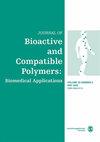Biophysical and in vitro wound healing assessment of collagen peptides processed from fish skin waste
IF 2.1
4区 生物学
Q3 BIOTECHNOLOGY & APPLIED MICROBIOLOGY
引用次数: 1
Abstract
The present study was conducted to examine the bioactive and wound healing properties of collagen hydrolysate derived from Piaractus brachypomus (pacu) fish skin waste. Collagen type I (P coll.) yielding 72.25% was isolated from skin waste by following acid-soluble collagen extraction method. Further, collagen was fragmented using bacterial collagenase and the processed collagen hydrolysate (peptides) was in the range of 10–15 kDa that was further purified using ion-exchange chromatography. The FTIR spectra of both P coll. and collagen hydrolysate (PSCH) were nearly similar showing that PSCH retained the structural and chemical composition similar to its parent molecule (P coll.). Solubility analysis revealed that PSCH has slightly better solubility compared to P coll. Similarly, scanning electron micrographs also exhibited more uniform and porous microstructure of PSCH compared to P coll. Further, PSCH was found to be efficient in peroxide quenching (64.5%) and radical scavenging activities (85.74%). MTT studies confirmed PSCH to be non-toxic displaying 84.68% cell viability at the highest concentration (3 mg/ml) and hemocompatibility test revealed PSCH to be non-hemolytic with minimal lysis of only 2.1% of human RBCs. In addition, PSCH also displayed a remarkable wound closure ability of more than 80% at 12 h and 100% within 24 h. Hence, these findings suggest that recycled PSCH has potent wound healing ability and can be produced economically on a large scale for possible biological applications in regenerative medicine.鱼皮废弃物加工胶原肽的生物物理和体外伤口愈合评价
本研究旨在研究从短腹松子鱼(Piaractus brachypomus, pacu)鱼皮废料中提取的胶原蛋白水解物的生物活性和伤口愈合性能。采用酸溶性胶原蛋白提取方法,从皮肤废弃物中分离得到了产率为72.25%的I型胶原蛋白。此外,胶原蛋白使用细菌胶原酶进行碎片化处理,处理后的胶原水解产物(肽)在10-15 kDa范围内,并使用离子交换色谱进一步纯化。两者的FTIR光谱。和胶原水解液(PSCH)几乎相似,表明PSCH保留了与其母体分子(pcoll .)相似的结构和化学成分。溶解度分析表明,PSCH的溶解度略好于pcoll。同样,扫描电镜也显示出PSCH比P - coll更均匀和多孔的微观结构。此外,PSCH还具有过氧化氢猝灭(64.5%)和自由基清除(85.74%)的活性。MTT研究证实PSCH无毒,在最高浓度(3 mg/ml)下显示84.68%的细胞活力,血液相容性试验显示PSCH无溶血作用,只有2.1%的人红细胞溶解。此外,PSCH也表现出显著的伤口愈合能力,在12 h时超过80%,在24 h内达到100%。因此,这些发现表明再生的PSCH具有强大的伤口愈合能力,并且可以经济地大规模生产,可能用于再生医学的生物学应用。
本文章由计算机程序翻译,如有差异,请以英文原文为准。
求助全文
约1分钟内获得全文
求助全文
来源期刊

Journal of Bioactive and Compatible Polymers
工程技术-材料科学:生物材料
CiteScore
3.50
自引率
0.00%
发文量
27
审稿时长
2 months
期刊介绍:
The use and importance of biomedical polymers, especially in pharmacology, is growing rapidly. The Journal of Bioactive and Compatible Polymers is a fully peer-reviewed scholarly journal that provides biomedical polymer scientists and researchers with new information on important advances in this field. Examples of specific areas of interest to the journal include: polymeric drugs and drug design; polymeric functionalization and structures related to biological activity or compatibility; natural polymer modification to achieve specific biological activity or compatibility; enzyme modelling by polymers; membranes for biological use; liposome stabilization and cell modeling. This journal is a member of the Committee on Publication Ethics (COPE).
 求助内容:
求助内容: 应助结果提醒方式:
应助结果提醒方式:


